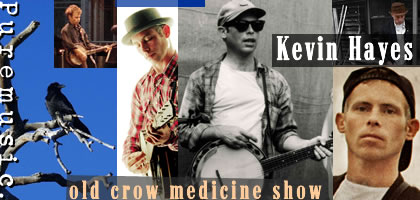
A Conversation with Ketch Secor of OCMS (continued)
PM: I know so tragically little about the band, and the bio is so understated. Maybe you'd allow me a few historical-type questions.
KS: Sure. Shoot.
PM: I know that the members are from different places. How did you guys meet up and start rolling?
KS: Well, the band probably came together first when Ketch and Critter were in the seventh grade together. That's when the two of us met and first began playing music together.
PM: And that was where?
KS: That was in Harrisonburg, Virginia, which is in the Shenandoah Valley.
PM: Sure, I've been to Harrisonburg.
KS: And then we flash forward about eight years to New York State, where I happened to be, trying to get in good with a gal, and I brought my friend Critter up with me. We met up with some players up in New York, namely Willie Watson. And then we dragged in a guy that I'd met on the streets of Bar Harbor Maine, he was up there raking blueberries, and I was on the street in front of a jewelry store playing the banjo, and that was Kevin Hayes. And we brought him down from Haverhill, Massachusetts, where he's from. And we assembled a whole bunch of these players all around Ithaca, New York, where there is a very lively old-time music scene.
PM: Right.
KS: And that's when we started our first tour.
PM: Was Kevin Hayes playing five-string when you first met him?
KS: No. Kevin was playing the guitar. And then about three years into the band, about halfway through up to this point, he switched over to the guit-jo. And at this point, Kevin is probably, in my estimation, the only professional guit-jo player in America. And I only say that because I've never met another pro guit-jo player. I've met people who use it in their live shows, but nobody who plays it solely.
PM: Yeah. And I'm all about finding out more about the guit-jo. What can you tell me? I mean, I'm trying to determine, as I listen to the record, "Well, that's the five-string, that's the guit-jo." I can't quite get a handle on how he plays that thing, and what's it all about?
KS: Well, the guit-jo is a very percussive instrument, and it's got the kind of hollowness that the banjo has, that kind of plunk that the banjo has, but it doesn't have a twangy thing. It's not really high end. It's like an empty, hollow, bass-y sound. If you need to identify it on the record, once you hear it, once you identify it as the guit-jo, then you'll be able to determine where it is through the record. Because once you know what it sounds like, I mean, it only sounds like a guit-jo. You'll never have it confused with anything else.
PM: And is he playing it fingerstyle or is he playing with a plectrum?
KS: He's doing a little bit of both. Primarily he plays with a pick. He plays a 1931 Gibson banjo. It's the GB-100, the Guitar-Banjo 100 series. They used to be prominent in bands like the Hot Five and the Hot Seven of Louis Armstrong fame. There was also a guy named Papa Charlie Jackson who made records and was included on the Harry Smith Anthology, and he was a Mississippian guit-jo player.
PM: Wow. Well, yeah, I appreciate that, because I'm going to go get me some guit-jo records and look into that. That's a great sounding axe.
KS: Yeah. I think it's awesome. And it's a big part of our sound.
PM: Absolutely.
KS: Kevin's got this kind of loose rhythm that sometimes comes ahead and sometimes behind, and it just adds to the fullness. If it was a guitar, it wouldn't sound nearly as cool.
PM: Yeah, it would sound too regular.
KS: It's got lots of rakes and pulls. It's a trickster instrument.
PM: Right.
KS: He actually was able to play Sam McGee's old guit-jo, Sam McGee being--you know Sam, one of the early Opry performers.
PM: Sure.
KS: Kevin played Sam's guit-jo. It was about two years later a model than Kevin's. I think he had a '33. But Kevin found a guy down in Franklin who had Sam's guit-jo, and he was able to play it.
PM: Reminds me of the first day I ever got to Nashville, I ran into Marty Stuart at SIR. And someone introduced to him. He said, "You want to play Clarence White's guitar?" I said, "Yeah, sure." [laughs]
KS: [laughs] "Sure thing." continue
print (pdf) listen to clips puremusic home